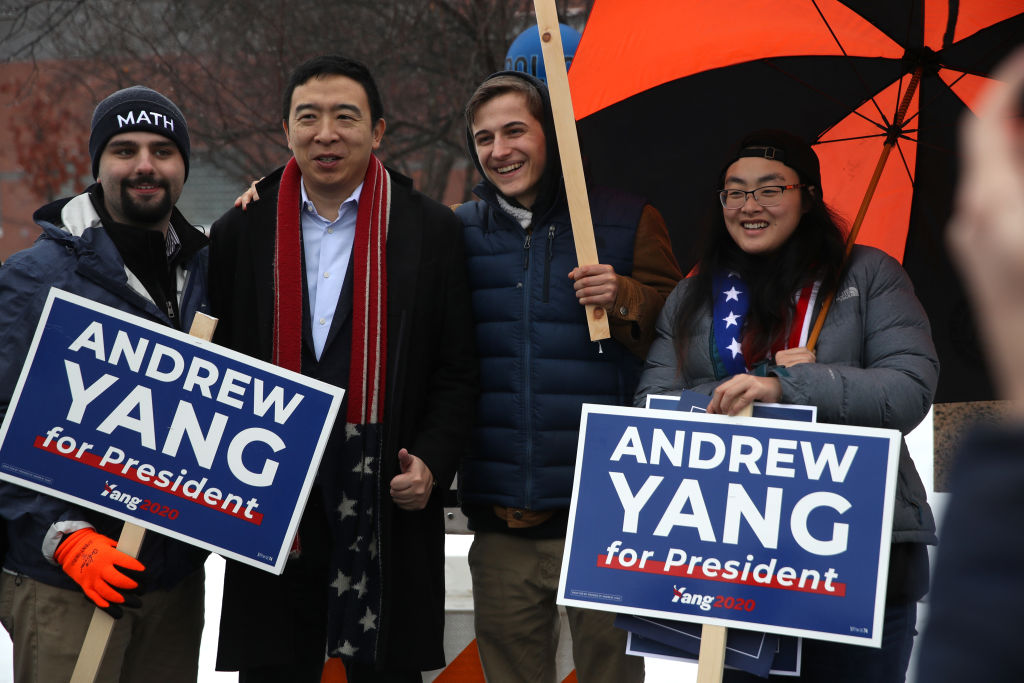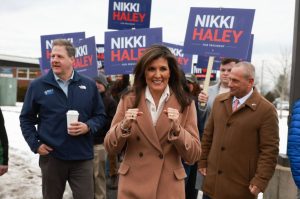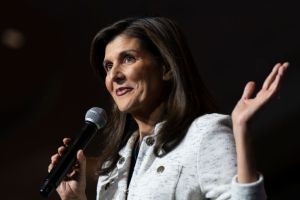In the words of the late great Joe Strummer, ‘everybody’s looking for the last gang in town’. In Democratic politics today, they’re looking for the Yang Gang. After New York entrepreneur Andrew Yang ended his improbable run for the presidency on the night of the New Hampshire primary, attention immediately turned to the allegiances of his notoriously enthusiastic supporters. Would they defect to Bernie Sanders, whose candidacy many had supported in 2016? What about Michael Bloomberg, a fellow New Yorker with a healthy following in the tech industry?Take it from me, a card-carrying member of the Yang Gang: I have absolutely no idea. In the days after Yang announced he was suspending his campaign, #StillVotingYang trended on Twitter among loyalists who said that in lieu of voting for another Democrat in their states’ primaries, they’d write in Yang’s name even if he wasn’t on the ballot. Some vocal members of the ‘gang’ also rebuffed outreach attempts from other campaigns, claiming it was too soon — even though the Bloomberg campaign reportedly has been snapping up former Yang field staff (and the billionaire’s self-funded campaign is said to pay extremely well). To complicate things further, the candidate himself has declined to endorse any of his Democratic rivals, though he said he’d make an endorsement for a candidate who supported his signature campaign issue of universal basic income, the ‘Freedom Dividend’ and would support the party’s eventual nominee either way. I argued a while ago that a sizable portion of Yang’s supporters were backing him because of his attitude and approach rather than on any of the issues, even the Freedom Dividend — the system-be-damned types who in prior elections may have supported wacky Republican Ron Paul even if they weren’t politically aligned with him. Then there were others who were attracted to some other one of Yang’s many unorthodox policy platforms, some of which verged on the eccentric, like ‘making taxes fun’. What it all added up to was a supporter cohort that wouldn’t necessarily go in an easy direction. Sure, I know some who said they’d be supporting Bloomberg or Sanders, as well as others who said they planned to not vote at all. And then there’s the fact that some weren’t Democrats to begin with. When an Emerson College poll found that Yang supporters were dramatically less likely to support other Democratic candidates, the accusations started flying that his followers were rife with turncoats and stealth Trump fans. (Some people seem to need a reminder that political independents do, in fact, exist.) But here’s the thing: there’s been every indication that the Yang Gang will remain the Yang Gang. Andrew Yang, for one, isn’t going anywhere. He’s young — a staggering three decades younger than Bernie Sanders and Michael Bloomberg. He’s already returned to Twitter in full force after a brief hiatus. He’s joined CNN as a political commentator, and is teasing an even bigger announcement in the next few weeks. (Please, Andrew, don’t go on Dancing With The Stars.)It’s rare for a political candidate to not only maintain a cohesive following after dropping out of a race but to also have the savviness (and wherewithal) to maintain it. That could change, especially if Yang is successful at keeping the ‘gang’ active and continues to grow his profile. Politicians cultivating a dedicated following regardless of whether they’re in office or campaigning could become the norm — and depending on your opinion (or your opinions of the politicians in question), that’s either a great way to cultivate citizen engagement or a sad sign of how our political system continues to grow more similar to reality TV. And, yes, it could make it maddeningly difficult for other candidates to get through to voters who hold their political allegiances with the same loyalty that they do their favorite sports teams. But it’s the political media landscape we’re headed toward, especially if Michael Bloomberg’s high-profile strategy of buying his way to social media fame and meme hype backfires. The lesson the political world takes from an outcome like that could be that a genuine following in the digital age takes something very different than unlimited gobs of money. And in that case, we won’t just have Andrew Yang and the Yang Gang sticking around — we’ll have many more like them.
I argued a while ago that a sizable portion of Yang’s supporters were backing him because of his attitude and approach rather than on any of the issues, even the Freedom Dividend — the system-be-damned types who in prior elections may have supported wacky Republican Ron Paul even if they weren’t politically aligned with him. Then there were others who were attracted to some other one of Yang’s many unorthodox policy platforms, some of which verged on the eccentric, like ‘making taxes fun’. What it all added up to was a supporter cohort that wouldn’t necessarily go in an easy direction. Sure, I know some who said they’d be supporting Bloomberg or Sanders, as well as others who said they planned to not vote at all. And then there’s the fact that some weren’t Democrats to begin with. When an Emerson College poll found that Yang supporters were dramatically less likely to support other Democratic candidates, the accusations started flying that his followers were rife with turncoats and stealth Trump fans. (Some people seem to need a reminder that political independents do, in fact, exist.) But here’s the thing: there’s been every indication that the Yang Gang will remain the Yang Gang. Andrew Yang, for one, isn’t going anywhere. He’s young — a staggering three decades younger than Bernie Sanders and Michael Bloomberg. He’s already returned to Twitter in full force after a brief hiatus. He’s joined CNN as a political commentator, and is teasing an even bigger announcement in the next few weeks. (Please, Andrew, don’t go on Dancing With The Stars.)It’s rare for a political candidate to not only maintain a cohesive following after dropping out of a race but to also have the savviness (and wherewithal) to maintain it. That could change, especially if Yang is successful at keeping the ‘gang’ active and continues to grow his profile. Politicians cultivating a dedicated following regardless of whether they’re in office or campaigning could become the norm — and depending on your opinion (or your opinions of the politicians in question), that’s either a great way to cultivate citizen engagement or a sad sign of how our political system continues to grow more similar to reality TV. And, yes, it could make it maddeningly difficult for other candidates to get through to voters who hold their political allegiances with the same loyalty that they do their favorite sports teams. But it’s the political media landscape we’re headed toward, especially if Michael Bloomberg’s high-profile strategy of buying his way to social media fame and meme hype backfires. The lesson the political world takes from an outcome like that could be that a genuine following in the digital age takes something very different than unlimited gobs of money. And in that case, we won’t just have Andrew Yang and the Yang Gang sticking around — we’ll have many more like them.
What’s next for the Yang gang?
Andrew Yang, for one, isn’t going anywhere

Andrew Yang in Keene on the day of the New Hampshire primary
In the words of the late great Joe Strummer, ‘everybody’s looking for the last gang in town’. In Democratic politics today, they’re looking for the Yang Gang. After New York entrepreneur Andrew Yang ended his improbable run for the presidency on the night of the New Hampshire primary, attention immediately turned to the allegiances of his notoriously enthusiastic supporters. Would they defect to Bernie Sanders, whose candidacy many had supported in 2016? What about Michael Bloomberg, a fellow New Yorker with a healthy following in the tech industry?Take it from me, a card-carrying member of…

















